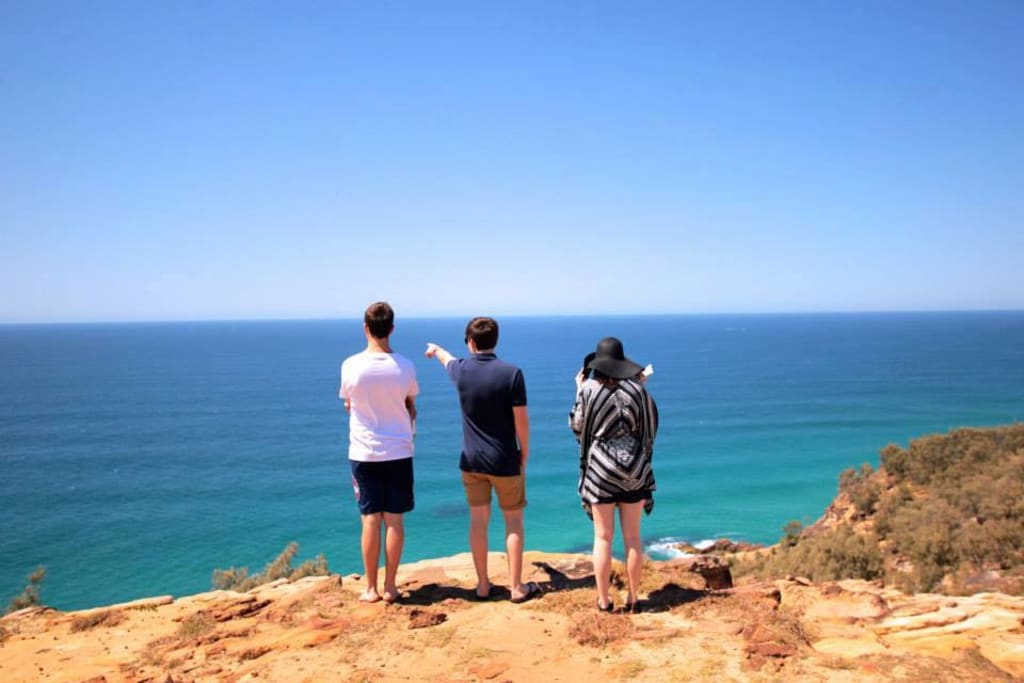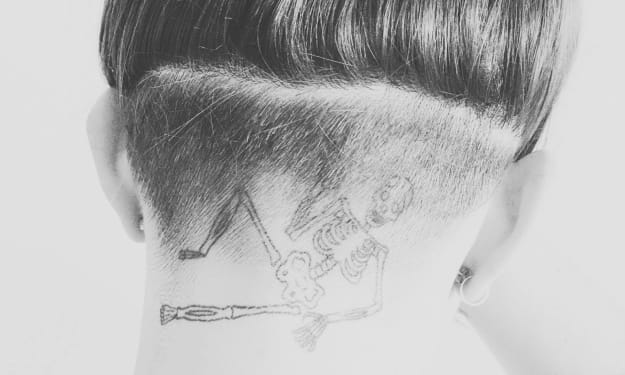
We call this ‘the Wild Side’ of Moreton Island.
The eastern beach, like many other beaches in Australia, has long stretches of white sand. One side, dunes topped with dry hardy shrub grasses; the other side ocean endlessly blue rolling waves, a little angry. We don’t swim here often. It has dangerous rips and a certain sharkyness.
My husband drives. The silica in the sand squeaks under low tires. I watch the ocean pass hoping to see a fin cut through those waves. It would be satisfying to see they are there, those sharks I fear but never see, except in faded photos at the takeaway shop in Bulwar. New Zealand is out there if I could see far enough; nothing between us and them.
We drive in silence.
He doesn’t like to do two things at once; sometimes he plays music but not today. We are headed to the lighthouse. We pass fishers, and other four wheel drives packed with surfboards, camping gear, and eskies (no doubt full of beers). This island is a man’s place. Even the dunes (second highest in the southern hemisphere) are muscular, ambitious and solid. Most of the women you’ll see here are like that; they’ve been hardened by sun, double baked like biscotti.
The lighthouse is a good place to watch for whales. We’re likely see humpbacks migrating past, it’s the right time of year. In the spring they return south to colder waters for feeding. They have bred and fed and return. I guess we’re the same. Our children are grown and gone now, but we keep returning to places we went before. Both us and the whales locked into a pattern. Do they ever want to break out and visit Finland instead of heading back to the Antarctic. I suspect if they broke the pattern once, they’d get lost and die.
We hike up the rocky sandstone steps to the lookout. He grabs my hand, always steadying me, guiding me, it’s automatic, like when the turtles surface for air. This gesture is habitual, and although it makes me feel like a child, I take his hand. From this place you can see the whole island, all the way to Stradbroke. I can see Amity Point, that beach where a poor girl was taken by two bull sharks. She—swimming at dusk, only a meter or so from the beach. She bled out before the guards got her to shore. That night at the resort the dolphins didn’t come in for their usual feed. I’d been working there then and it was eerie when they didn’t show up.
“ So—you’ll be at your mother’s.”
“ Let’s not keep going over this, not now. Look, there’s one.”
The humpbacks blow plumes of water several meters in the air, they’re easy to spot. Then they roll their humpbacks and disappear under the surface. They don’t need to breathe much. They don’t get divorced.
“ Can we stop by Honeymoon Bay?”
This was my favourite spot. It was probably the prettiest place on the island to swim and it was a pain to get to, so hardly anyone went there. No tourists. No bus loads of Chinese. He proposed to me there. No ring, but he said we should get married. What did we know? He was twenty three, I was twenty and pregnant. He pulls the ute off the dirt road and onto a more narrow and more bumpy track at the north end of the island. We scamper down the path. It hurt his knees, but he isn’t a complainer. The grass is pretty high and I worry about snakes so I stomp hard to scare them off. The bay is aqua blue, wineglass-shaped, and edged with rocks. The waves tumble over and make frothy foam pools. If the rest of the island is masculine, this one place is feminine, the water more pale and inviting, the rock boarder secure and protective. When the kids were little this is where I’d like to bring them before they became mad keen surfers.
I change into my swimmers and rashie; he looks away. He used to like to see me naked, maybe now he doesn't think he has the right. He doesn't change out of his clothes. He finds some shade under a gumtree and lights up a cigarette and opens the beer he’d brought down. I can’t tell behind his sunglasses how he's feeling now. He’s grown accustom to the news and he is slipping away from me, just as I am about to leave him.
“Don’t go too deep.”
I was always a good swimmer. I dive into the waves headlong and feel them rush over my back and legs. I peer back at the shore. Another couple had found our spot. They look young. He carries a short pointed nose surf board: she wears a tiny black bikini. They could have been us twenty five years ago. The boy bounces into the bay with his board, his girl settles on a sunny rock not far from my husband, my soon to be ex-husband. From a distance he still looks handsome, a bit weathered but men wear that well. I find the champagne pools and lay in the bubbles. I will miss this place but I have sworn not to return. I can’t move in two directions simultaneously. We agreed. It is his place. He’ll come here fishing, beer drinking, camping with mates. They’ll rally around him, once they know. And he’ll bring our boys here for surf trips. I will find new places.
The surf boy shot past on his board. His brown strong arms pull him easily through the shore break as he heads off to find the larger waves. He smiles at me. Not a care in the world. That is youth. I decide to just swim to other side of the bay. Back on shore they are talking, my old man and that young woman. He laughs at whatever she said. It’s good that he can laugh. They’d say he’ll be with someone else sooner than I will. Not that I am looking for anyone, I’m not. I want to be on my own.
I turn to cross the bay, stretch my strokes as I head for the opposite shore. Swimming is a mediation, you just breath and kick and pull and breathe and kick and pull. I try not to think of sharks. You are more likely to die in a car accident. You are more likely to get killed by a coconut falling on your head. You are more likely to win the lottery, (I’m not certain about that one).
I get almost half way across when realise my mistake. I’m swimming in a rip. I feel tug of the ocean, down and out. The first rule is not to panic, I know this but it is quite terrifying to feel the power of a strong rip tearing you away from shore. I let it pull me. There is no fighting it. I raise my arm. He waves and goes back to talking to the girl. I yell but sound of the surf swallows my cry. I try to swim across the rip parallel style, but I am still being pulled out to sea. I swallow some sea water in a gulp. Again I thrust my arm up in more panic and see him, my husband stand up and stare out. He sees me. But I am too far out. He kicks his shoes off and leaps into the water. I go under. A strong young brown arm grabs my rashie. He pulls. I come up gasping and hold onto his board. He laughs as if this was nothing.
“ You’re alright.”
He pulls me up on to the board and paddles to shore. His girlfriend runs out to meet us. She fusses over me, gets me towel and sits me down. I am still coughing a bit, a tearing.
“You’re lucky.”
The surf boy unhelpfully smacks me on the back. The girl just stands there looking concerned. No one noticed. I didn't noticed, I was in a panic for myself. David had come in to rescue me.
“Where is he?”
The beach is empty. The surf is empty. The surf boy jumps back on his board and goes out to search. They dial 000.
And we wait.
This breed of man that I was leaving was hard to know and hard to live with. When we were young he was available and real to me. He used to dream of adventures in a camper, touring surf spots on the coast. Some nights he would stare at the stars and ask me what I thought about things. We felt lucky.
Now he must be suspended in blue-green of the South Pacific floating on the current that divides us from off New Zealand. I could picture him gasping, sinking as his heavy clothes got waterlogged and weighed him down. He wouldn’t yell out for help. He’d rather surrender to the sea than to ask for help. He’d struggle as the water filled his lungs, his eyes would panic madly like a crazed horse, then he’d twitch in the last seconds of panic and give up. Everyone has to, eventually, and then he would float slowly down as the humpbacks sing, schools of blinking fish would swim past, the sea turtles might float over top. And he’d be gone. His bones would be picked first by sharks then by smaller predators. His bones may well turn up back on the beach like the giant shells of the turtles do, bleached white by salt and sun.
Perhaps he did it intentionally. His friend Steve had done so when his wife left. Australian men are more fragile than they look; they don’t adapt well to change. Like the whales, they want a life that is set on repeat, a reliable, predicable pattern of breed, and feed and return.
Don’t think that this came to me then. At that time I am utterly in shock. It takes a while before the rescue crew arrives. I can’t stop searching for him in the surf. Shock makes me shake, and I cry and gulp air then my crying subsides. I suddenly uncontrollably start to quiver. The emergency worker gives me a sedative and everything goes flat, eerie calm, like when the dolphins didn’t come in that time—unnatural. I was leaving him but when he left me like that so sudden and unexpectedly it felt cruel, intentional.
I am angry with him for years after. He manages to keep me with him after all. They never did find his body, and we didn’t get divorced. I didn’t tell anyone I was leaving. What’s the point? Now I’m his widow, still his, still defined by him, and I think of him and that day over and over again. I’m stuck in a new pattern, swimming along side him wordlessly, silently in dreams. We float along with the humpbacks and their song is mournful. In tears I wake up with the taste of the sea on lips.
It’s my place now. This island has become my husband. Now I drive our old beat up Ute with tires let down to 18psi. I visit the Wild Side every time I go to the island and I watch the endless rolling waves and check for bleached bones that might have washed up on the shoreline. The warm sands, his hug; the blue sky, his eyes.
Our boys are coming over by the ferry this weekend. They are bringing a new wife and the first baby boy. He’d would have liked that—I guess.
About the Creator
A.J. Roberts
Just a human writing stuff. She thinks sad songs are better, that that laughing is close to crying, that good spelling isn't proof of intelligence but she does enjoy the odd semi colon.






Comments
There are no comments for this story
Be the first to respond and start the conversation.